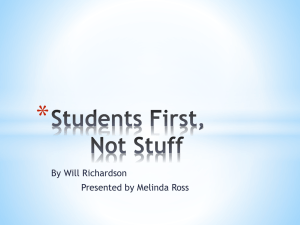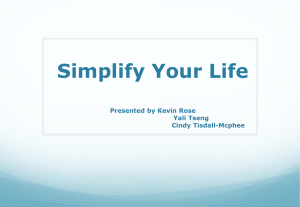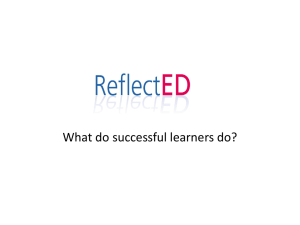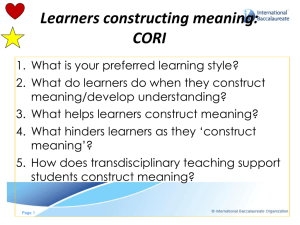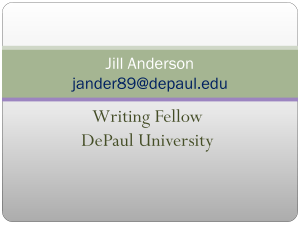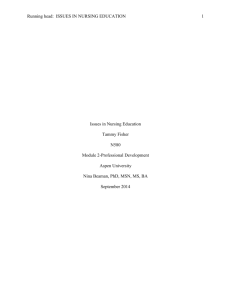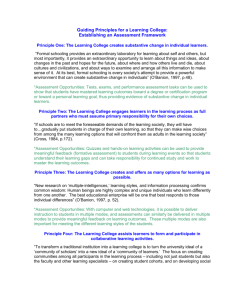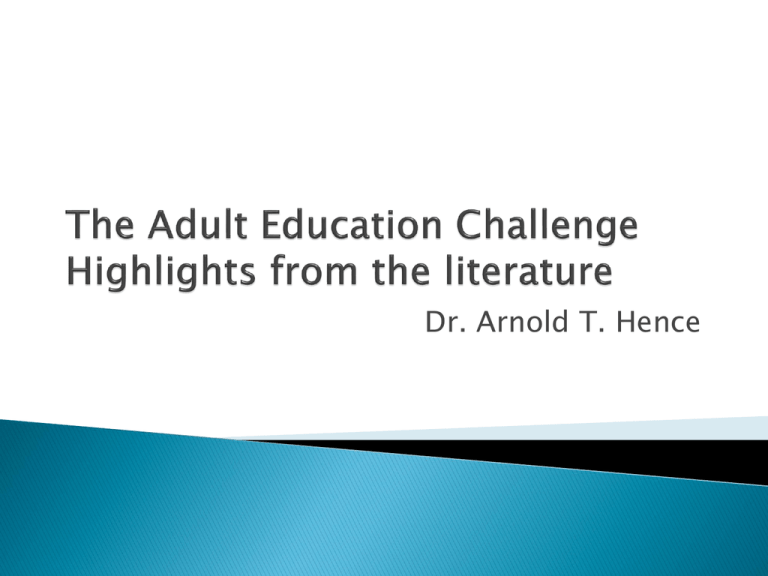
Dr. Arnold T. Hence
Adults:
Are goal oriented
Are autonomous and self directed
Have accumulated a foundation of life
experiences
Are relevancy oriented
Need to be shown respect
Jane Vella’s 12 Principles
Needs assessment: Learners need to
participate in naming what’s to be learned
Safety: People need safe environments in
which to trust themselves to dialogue esp if it
may be intentionally transformational
Sound relationship: Friendship but not
dependency, fun w/o trivialization of learning
dialogue between men and women who
consider themselves as peers.
Sequence and reinforcement: Move from
small to big, slow to fast, easy to hard
Action with reflection (praxis) Description,
analysis, application, implication
Learners as subjects of their own learning:
Decision makers in their own learning
process.
Learning
with ideas, feelings and actions
Immediacy: Learning and teaching what is
really useful in a particular context
Clear roles: What are you expected to be
(professor, mentor, decision-maker, etc)
Teamwork: What kinds are expected in your
institutional setting, classroom etc?
Engagement: Helping learners express
interest and invest in a learning event
Accountability:
You are accountable to the
students and they are accountable to you.
Ascertain that learning occurs.
Teach what you proposed to teach, make sure
they learn what they were supposed to learn
and can demonstrate it.
Measurable learning outcomes and assessment
The
Forsyth Tech Learning Centered College
Initiative
College wide training in developing and
writing measurable outcomes
Mapped all programs
Assessment
Ready for upcoming SACS visit
The Learning College creates
substantive change in
individual learners
The Learning College engages
learners in the learning
process as full partners who
must assume primary
responsibility for their own
choices
The Learning College creates
and offers as many options for
learning as possible
The Learning College helps
learners to form and
participate in collaborative
learning activities
The Learning College defines
the roles of learning
facilitators in response to the
needs of the learners
The Learning College and its
learning facilitators succeed
only when improved and
expanded can be documented
for learners
Create and nurture an
organizational culture
that is open and responsive
to change and learning
Food for thought on curriculum development
(Derived from Malcolm Knowles)
Pedagogy
(“child conductor” in the Greek) does
not always fit the needs of the adult learner
Andragogy (the art and science of helping adults
learn) provides a better model.
A problem/project orientation; experienced
based techniques; facilitation of self motivation
to encourage learning
A student moves from being dependent to being self
directed
Students accumulate a growing reservoir of
experience that becomes an increasing resource for
learning
Student’s readiness to learn becomes oriented
increasingly toward the development tasks of his/her
social role
Student’s time perspective changes from postponed
application of knowledge to immediate application.
The orientation toward learning shifts from subject
centered to problem-centered
New models for learning must be developed based on
andragogy
Adults
Bring prior experience and knowledge with
them. Validate where they are; create allies,
not pupils
Want to know what’s in it for them
Enjoy speaking to each other not just
listening to you talk
Like to feel like an active part of the learning
process
Adults
Expect to be respected
Enjoy active learning, small group exercises
and moving around the room
Expect to be able to use what they learn
immediately
Learn and different speeds and thru different
methods
Need feedback and constructive criticism:
Don’t tear ‘em down—build ‘em up






